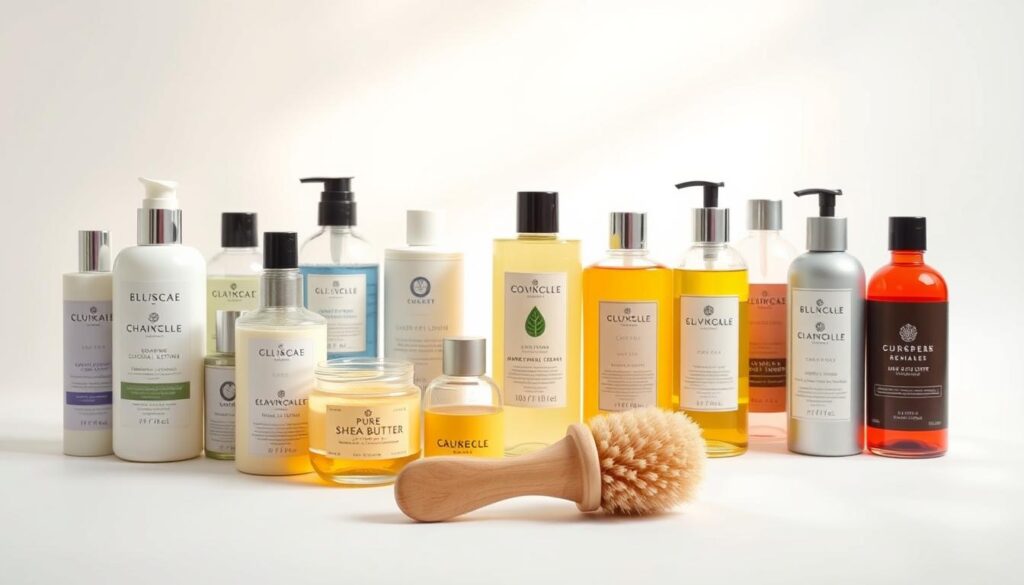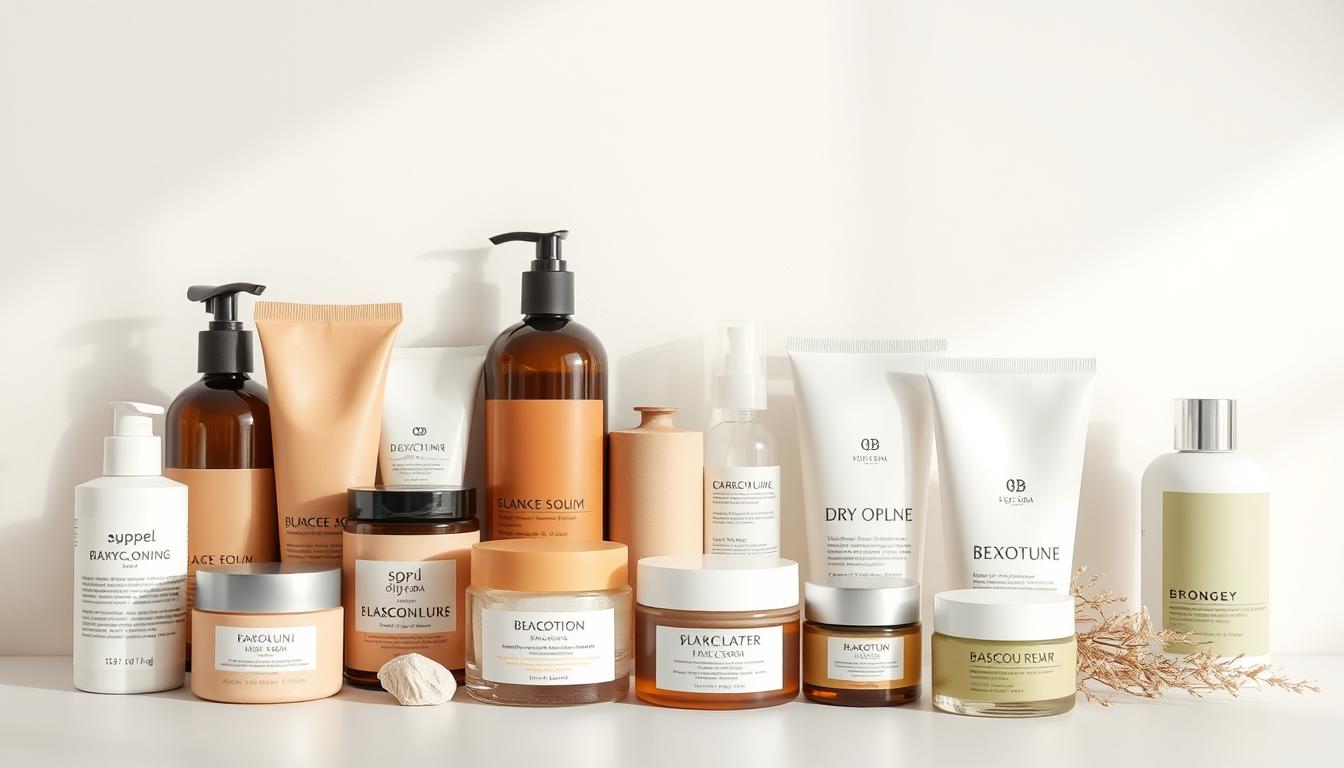Are you tired of dealing with dry, itchy skin? It’s a common problem that can be really uncomfortable. Dry skin can make you feel itchy and irritated all the time.
Experts say dry skin isn’t just a seasonal issue. It can cause itchiness, flaking, redness, and even pain all year round. Using a moisturising body wash is key. It helps keep your skin hydrated and supports the skin barrier.
Key Takeaways
- Understanding your skin type is key to picking the right products.
- Moisturising body wash is important for keeping your skin hydrated.
- Choose products that help support your skin barrier.
- Avoid harsh products that can take away your skin’s natural oils.
- Being consistent is important in managing dry skin.
Understanding Extremely Dry Skin
Extremely dry skin, or xerosis, means the skin lacks moisture. This can cause discomfort, itchiness, and even cracks and bleeding.
Causes of Dry Skin
Dry skin can come from many things. This includes the weather, harsh soaps, and health problems. Knowing why your skin is dry is key to fixing it.
Symptoms and Effects
Dry skin symptoms can be mild or severe. They include itchiness, tightness, and flakiness. If not treated, it can turn into eczema or dermatitis.
Managing Dry Skin
Managing dry skin needs good skincare and lifestyle changes. Use gentle cleansers, moisturize often, and avoid harsh products that take away natural oils.
Tips for Dry Skin Care
- Moisturize right after bathing.
- Avoid harsh soaps or cleansers.
- Drink lots of water to stay hydrated.
- Wear protective clothes to keep your skin safe.
Understanding dry skin causes and using good skincare can help. This way, you can ease the discomfort of dry skin.
Key Ingredients to Look For
It’s important to know what’s in your bath and body products to fight dry skin. Look for ingredients that moisturize, repair, and protect your skin.
Essential Oils that Hydrate
Essential oils are great for keeping dry skin hydrated. Coconut oil, jojoba oil, and lavender oil are top choices. They moisturize and make your skin healthier.
- Coconut oil: Rich in fatty acids, it deeply nourishes dry skin.
- Jojoba oil: Closely resembles the skin’s natural oils, making it an excellent moisturizer.
- Lavender oil: Not only hydrates but also calms irritated skin.
Humectants: What to Seek
Humectants help keep your skin moist. Glycerin and hyaluronic acid are top choices. They draw moisture from the air to hydrate your skin.
| Humectant | Benefits |
|---|---|
| Glycerin | Attracts moisture, soothes dry skin |
| Hyaluronic Acid | Retains moisture, improves skin elasticity |
Emollients and Occlusives Explained
Emollients and occlusives help repair and protect dry skin. Emollients like jojoba oil and coconut oil smooth out your skin. Occlusives, such as petroleum jelly and dimethicone, lock in moisture.
“The combination of emollients and occlusives in bath and body products can significantly improve the health and appearance of dry skin by providing both repair and protection.” – Skincare Expert
When picking products for dry skin, choose ones with these ingredients. This way, your skin gets the moisture and protection it needs.
Recommended Bath Products
The right bath products can make a big difference for dry skin. It’s key to pick products that match your skin type and needs.
Gentle Cleansers for Dry Skin
For dry skin, choose gentle cleansers that are fragrance-free and hypoallergenic. These cleansers keep your skin’s natural barrier intact without causing irritation. Look for hydrating body washes made for dry skin to help keep moisture in.
Some top body washes for dry skin are made for sensitive skin body care. They avoid harsh chemicals and artificial fragrances that can make dryness worse.
Exfoliating Alternatives
Exfoliation is key, even for dry skin. Instead of rough scrubs, try gentle exfoliants or natural scrubs. They remove dead skin cells without irritating your skin.
For more tips on body washes, check out this guide on the best body washes for dry skin.
Soothing Bath Oils and Additives
Soothing bath oils and additives can make your bath more relaxing and moisturizing. Oils like coconut and olive oil are great for hydrating. You can add them to your bath water or apply them to your skin after bathing.
When picking bath additives, choose ones with natural ingredients. Avoid those with artificial fragrances or dyes that can irritate dry skin.
Choosing Moisturisers Wisely
Finding the right moisturizer is key to improving dry skin. The type of moisturizer you pick is very important. There are many types of moisturisers, each with its own benefits.
Types of Moisturisers: Lotions vs. Creams
Moisturisers come in two main types: lotions and creams. Lotions are light and soak in quickly. They’re great for everyday use, even in warm weather. Creams, being thicker, offer deeper moisturizing. They’re best for very dry skin or in cold weather.
| Moisturiser Type | Characteristics | Best For |
|---|---|---|
| Lotions | Lightweight, easily absorbed | Everyday hydration, warmer weather |
| Creams | Rich, intense moisturizing | Very dry skin, colder weather |
Ideal Moisturiser Ingredients
Look for moisturizers with ingredients that keep your skin hydrated and repair it. Hyaluronic acid, ceramides, and niacinamide are great choices. Hyaluronic acid holds moisture, ceramides fix the skin’s barrier, and niacinamide makes skin more elastic and hydrated.

Layering Moisturisers for Better Results
Layering moisturisers can improve your skin’s hydration and health. Start with a light moisturizer or serum, then add a richer cream or oil. This method keeps moisture in and hydrates your skin for longer.
- Begin with a hydrating serum or lightweight moisturizer.
- Apply a richer cream or body oil to lock in moisture.
- Reapply as needed throughout the day, after bathing or showering.
The Importance of pH Balance
Your skin’s natural pH balance is key to keeping it moist and healthy. It’s very important, even more so for those with extremely dry skin.
Understanding pH in Skincare Products
The pH level of a product shows if it’s acidic or alkaline. Your skin’s natural pH is slightly acidic, between 4.5 and 5.5. This acidity protects your skin from harmful bacteria and other dangers.
How pH Affects Dry Skin
Using products that are too alkaline can harm your skin’s natural barrier. This can cause dryness and irritation. pH-balanced products are vital for keeping your skin healthy. If your skin’s pH is off, it can get dry, irritated, and have other problems.
Here are some tips for picking the right pH-balanced products:
- Choose products labeled as ‘pH-balanced’ or ‘pH-skin-friendly’
- Stay away from products with high alkaline levels
- Go for gentle, fragrance-free cleansers that won’t mess with your skin’s pH
By picking the right products and keeping your skin’s pH balanced, you can keep it healthy and moist.
Incorporating Body Treatments
Dry skin needs more than just moisturizing. Body treatments offer intense hydration and nourishment. They help fight dryness and make skin soft and supple.
Body Butters vs. Regular Lotions
Body butters are rich and hydrating. They are thicker than regular lotions, making them great for dry skin. They contain natural ingredients like shea butter and coconut oil, locking in moisture.
Choosing between body butters and lotions depends on your skin. Body butters are best for very dry skin. Here are some key differences:
- Texture: Body butters are thicker, while lotions are lighter.
- Moisturizing Ability: Body butters hydrate more intensely.
- Usage: Use body butters on dry skin, and lotions daily for maintenance.
Treatment Oils and Their Benefits
Treatment oils nourish dry skin. They are rich in essential fatty acids and antioxidants. Argan oil, jojoba oil, and sweet almond oil are popular choices.
The benefits of treatment oils include:
- Deep Nourishment: They hydrate the skin deeply.
- Antioxidant Properties: They protect the skin from environmental stressors.
- Versatility: You can use them alone or under other products.
Overnight Treatments for Extra Hydration
Overnight treatments boost hydration. Apply them before bed for deep nourishment. Overnight masks and intensive creams are great for dry skin.
To use overnight treatments, apply a thick layer before bed. Massage it in. By morning, your skin will be softer and more hydrated.

Adding body treatments like butters, oils, and overnight masks to your routine helps dry skin. They provide the nourishment and hydration it needs to stay healthy.
Protecting Your Skin Year-Round
To keep your extremely dry skin healthy, it’s key to protect it all year. You need a skincare routine that changes with the seasons.
Best Practices for Daily Care
For daily care, use gentle, moisturizing products to keep moisture in. Stay away from harsh soaps that take away your skin’s natural oils. Choose cleansers that are free from fragrances and are hypoallergenic.
Moisturize right after bathing or showering when your skin is damp. This helps keep moisture in and supports your skin’s natural barrier.
Seasonal Adjustments for Skincare
Change your skincare routine with the seasons. In the winter months, use thicker, more moisturizing products to fight dry air and cold. In the summer, go for lighter products to control oil without drying out your skin.
- In winter, consider using a humidifier to add moisture back into the air.
- In summer, don’t forget to moisturize after swimming or spending time outdoors.
Importance of Sunscreen for Dry Skin
Sunscreen is vital for any skincare routine, even more so for dry skin. UV rays can dry out and damage your skin, making it more prone to irritation and conditions like eczema.
Choose a sunscreen that is moisturizing and good for sensitive skin. Look for zinc oxide or titanium dioxide, as they offer broad-spectrum protection without irritating your skin.
Tips for Bathing Rituals
Creating a relaxing bathing experience is more than just the water temperature. It’s about making a ritual that refreshes both body and mind.
Optimal Water Temperature
The best bathing temperature is between 98°F and 104°F (36°C to 40°C). Water that’s too hot can dry out your skin, causing irritation.
| Water Temperature | Effect |
|---|---|
| Too Hot | Dryness, irritation |
| Optimal | Relaxing, moisturizing |
Bathing Duration
Keep your baths short to avoid dryness. Spending too long in the bath can dry out your skin, causing irritation.
Post-Bath Care
After bathing, gently pat dry your skin with a towel. Apply a moisturizer right away to keep your skin moist and calm.
Conclusion: Building Your Skin Care Routine
By following the guidelines in this article, you can create a great skincare routine. It should tackle your dry skin worries. Always pick products that fit your skin type, stay consistent, and shield your skin from harsh elements.
FAQ
What are the best ingredients to look for in bath and body products for extremely dry skin?
For dry skin, look for shea butter, coconut oil, olive oil, and hyaluronic acid. These ingredients deeply hydrate and nourish. Ceramides and niacinamide also help fix the skin’s barrier.
How often should I moisturise my extremely dry skin?
Moisturise your dry skin right after bathing, when it’s damp. Reapply during the day, after washing your hands or showering. For best results, use multiple moisturisers to keep moisture in.
What type of cleanser is best for dry skin?
Choose a gentle, fragrance-free cleanser made for dry skin. Cream or oil-based cleansers keep moisture in. Avoid gel or foam cleansers, as they can take away natural oils.
Can exfoliating help with extremely dry skin?
Exfoliating is good for dry skin if done gently and not too often. Use a mild exfoliant with alpha-hydroxy acids (AHAs) or beta-hydroxy acids (BHAs) once or twice a week. It helps remove dead skin and improves texture.
Why is pH balance important in skincare products for dry skin?
pH balance is key because a product that’s too alkaline can dry out your skin. Look for products with a pH close to your skin’s natural pH (around 5.5). This helps keep your skin’s barrier strong and prevents irritation.
How can I protect my dry skin from the sun?
Use a broad-spectrum sunscreen with SPF 30 every day, even on cloudy days. Reapply every two hours or right after swimming or sweating. Physical sunscreens with zinc oxide or titanium dioxide offer extra protection.
What are some tips for bathing with extremely dry skin?
Bathe in warm, not hot, water. Keep baths or showers short, under 10 minutes. Use gentle, fragrance-free cleansers and pat dry instead of rubbing. Apply moisturiser right after bathing to keep moisture in.
Can body treatments like body butters and treatment oils help with dry skin?
Yes, body butters and oils provide deep hydration and nourishment. Use them as an extra moisturiser layer or as an overnight treatment to repair dry skin.
When should I consult a dermatologist about my dry skin?
See a dermatologist if your dry skin doesn’t get better with the right skincare or if you have itching, redness, or cracks. A dermatologist can find the cause and suggest treatments tailored for you.

